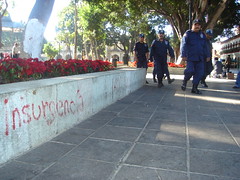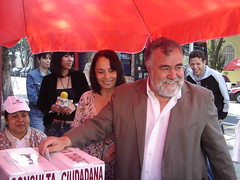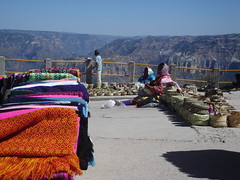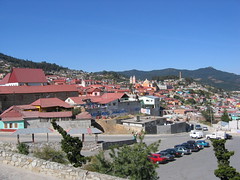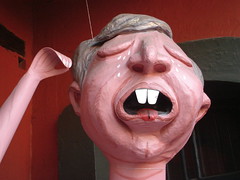 The next step in the López Obrador show
The next step in the López Obrador showBy DAVID AGREN
The News
Two years ago, an estimated 300,000 of Andres Manuel López Obrador's supporters packed the Zócalo in Mexico City to witness the anointing of the nation's "legitimate president." A year on, about 100,000 gathered there for his first "Informe" - his version of the president's state of the nation address.
This Thursday, López Obrador will once again rally the masses for an address. But he's not calling it an Informe - analysts say that's a reflection of the public having moved past the contentious 2006 election - and he won't be speaking inside the Zócalo, instead opting for a space nearby. Few expect turnout to be in the hundreds of thousands.
More than two years after the controversial 2006 election, López Obrador is soldiering on with his staunch opposition to the Calderón administration. And many of his loyalists - and some analysts - still see López Obrador as the nation's only true opposition leader and the most important figure in the Mexican left.
But Nov. 20, the anniversary of his "legitimate government" arrives on the heels of several setbacks for López Obrador. The energy reform package he tirelessly crusaded against was approved in Congress, and this past week, the Federal Electoral Tribunal, or Trife, quashed the aspirations of his preferred candidate for the leadership of the Democratic Revolution Party, or PRD.
Now, instead of trying to establish himself as a political force, the "legitimate president" is simply seeking to stay relevant in the public policy discourse, as well as capitalize on new crises like the deteriorating economic situation. Some see his trajectory as beyond his control, given how difficult it will be to set his own agenda in the face of an economic downturn, among other powerful forces.
"His future doesn't depend on him at this stage of the game," said ITAM political scientist Federico Estevez.
STAYING IN THE GAME
López Obrador has struggled to find relevance since assuming the "legitimate president" mantle.
Two years ago, he outlined a 20-point plan for rescuing the country. He borrowed heavily from the populist proposals of his presidential campaign, and later set out on a tour of the nation's municipalities to spread the message and denounce supposed electoral fraud.
His movement failed to gain much traction in the first year, as few media outlets followed him off the beaten path. In the meantime, Calderón achieved several major legislative victories.
In his Informe last year, López Obrador delivered a 2008 forecast of economic hardships brought about by rising prices and stagnant incomes. But his message was overshadowed by the actions of a small band of renegades who stormed the Metropolitan Cathedral to protest the usual ringing of the church's bells.
Events beyond López Obrador's control would continue to haunt him through much of 2008, although his tactics, at times, appeared to be inspired. The legitimate president suspended his nationwide tour to oppose energy reform proposals that would have allowed for greater private-sector participation in the government-run petroleum sector. He organized brigades of protesters, and loyal lawmakers shut down Congress for 16 days to prevent debate after Calderón presented his proposals. The buzz surrounding a July referendum on energy reform, sponsored by PRD factions loyal to López Obrador, even supplanted discussion of the actual proposals.
But then the agenda shifted abruptly to public security.
López Obrador was left protesting an issue that much of the public had stopped caring about. And instead of proposing solid solutions for security, he clumsily tried linking the end of energy reform to the maintaining of law and order.
"We all want our children and grandchildren [to be able to] walk the streets free of fear," he told a crowd in the state of Guanajuato on Aug. 17. "Therefore, I propose the following: The first thing we have to do is avoid the privatization, open or disguised, of the national petroleum industry."
On the evening of Sept. 15, he spelled out a 10-point plan for saving the country from deteriorating economic conditions and public security woes. Barely an hour later, two grenades tore through Independence Day festivities in Morelia, distracting attention from his message.
By the time Congress actually voted on the energy reform proposals - which some PRD senators were instrumental in crafting - López Obrador's opposition and brigades of protesters storming the barricades had become mere sideshows.
BREAKING UP THE PARTY
Analysts, as well as some in the PRD, say López Obrador ironically helped shape much of the final energy package, but that his intransigence and unwillingness to compromise ultimately hurt his own party.
"The only thing that he has achieved is to give more power to the [Institutional Revolutionary Party] and minimize the PRD's political weight," said pollster Jorge Buendía, of the firm Buendía y Laredo.
"The level of rejection toward the PRD is of such a magnitude that those looking to cast a protest vote no longer see the PRD as an attractive option. They're going to the PRI."
The energy reform issue highlighted López Obrador's uneasy coexistence with the PRD.
Now, the electoral tribunal ruling has allowed López Obrador's opponents to seize control of the party. Its overturning of the annulled PRD elections - which were primarily fought over López Obrador's strategy of avoiding all dealings with the federal government - has been regarded as a major blow to his party status.
The PRD's National Executive Committee also recently took measures to distance itself from the pro-López Obrador coalition known as the FAP by cutting off funding for the coalition.
His electoral allies in the Convergence party and Labor Party - part of the FAP - have remained unwavering in their support. "He's the most important voice of protest in this country," Convergence party Deputy Jose Manuel del Río Virgen told The News. "He still has strength."
But public opinion - in the past, the main source of López Obrador's strength - is proving problematic. A September poll by Ulises Beltrán y Asociados found that 50 percent of respondents hold a negative opinion of López Obrador.
This Thursday, turnout will be yet another gauge of the "legitimate" president's legitimacy in the eyes of the public.
ECONOMIC SALVATION
After a year filled with protests on energy and the continuation of cries of fraud, López Obrador recently changed his discourse to economic topics, including rising prices for food and fuel, stagnant incomes and a lack of support for the countryside. While touring Michoacán last weekend, he blamed the country's economic woes on "Calderón's ineptitude."
And analysts are at odds over whether he can regain ground by focusing on such matters.
Some, like Aldo Muñoz at the Universidad Iberoamericana, say the shift from the fraud issue is a smart one. As it disappears from the public consciousness - "[people] care more about the present situation than they do 2006," Muñoz said - focusing on the present crises is more important for López Obrador.
The ITAM's Estevez said the issue actually favors the former presidential candidate, who has long been waiting for the Calderón government to stumble badly, or encounter a crisis.
"He was betting that the Mexican economy would sink, and now it turns out that it may sink because of the world," Estevez said.
"It's no longer an untenable strategic position."
